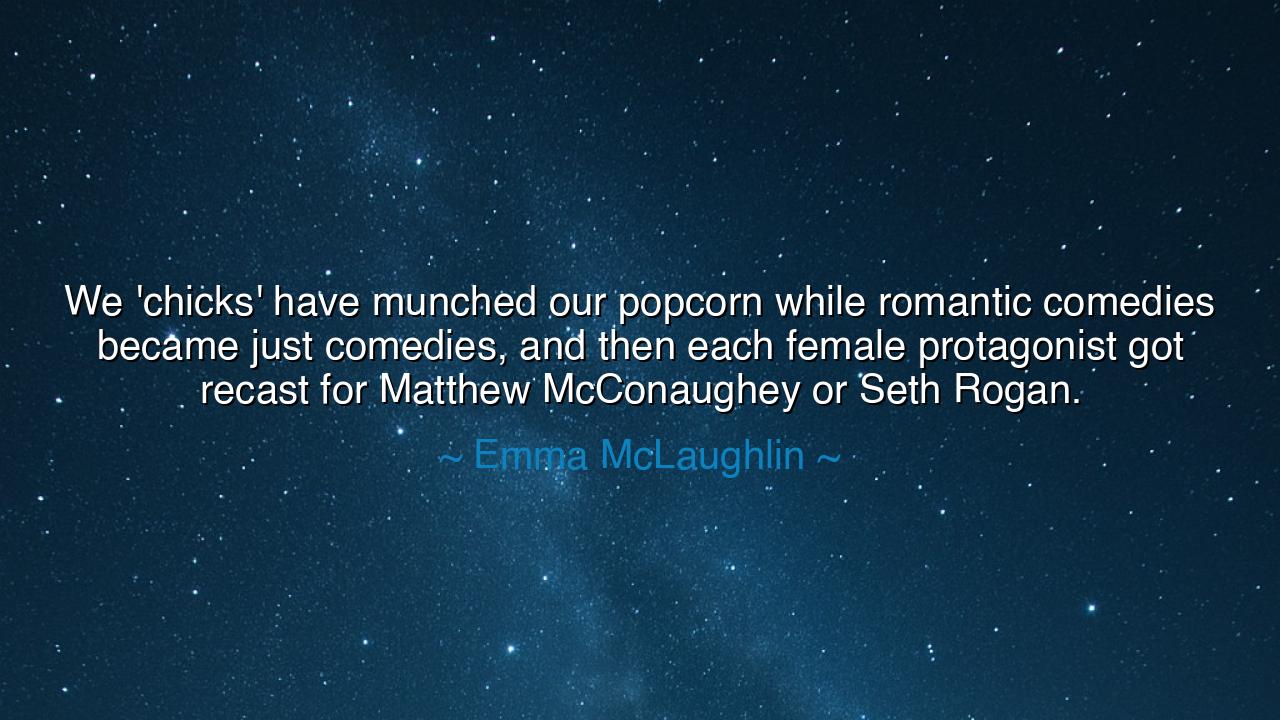
We 'chicks' have munched our popcorn while romantic comedies
We 'chicks' have munched our popcorn while romantic comedies became just comedies, and then each female protagonist got recast for Matthew McConaughey or Seth Rogan.






The words of Emma McLaughlin—“We ‘chicks’ have munched our popcorn while romantic comedies became just comedies, and then each female protagonist got recast for Matthew McConaughey or Seth Rogan”—resound as both lament and warning. They speak to the slow fading of a once-celebrated tradition, where women were placed at the heart of romantic comedies, carrying stories of love, joy, and self-discovery. Over time, these tales, once crafted around the feminine voice, were stripped of their depth and recast in the image of men, leaving women as shadows in narratives that were once theirs.
The origin of this observation lies in the history of cinema itself. In the golden age of Hollywood, the romantic comedy was a realm where female characters flourished. Katharine Hepburn, Audrey Hepburn, and Meg Ryan became symbols of wit, charm, and tenderness. Their characters were not merely lovers but individuals whose journeys shaped the story. Yet as decades passed, the genre shifted. The center tilted, and what was once a celebration of women’s perspectives dissolved into comedies where the female lead was often diminished, her role rewritten to serve as ornament or prize for the male hero.
History outside of film reflects a similar shift. In the courts of medieval Europe, courtly love elevated women as the stars of chivalric tales. The knight’s valor was tested by his devotion to a lady, whose grace and wit guided the narrative. But as power and storytelling evolved, these women were often silenced, their agency replaced by the triumphs of men. What McLaughlin names in modern cinema echoes this timeless pattern: when women’s stories grow too strong, they are sometimes pulled back into the margins by the tides of culture.
Yet there is a subtle heroism in McLaughlin’s words. She does not only point to loss, but to endurance: “we ‘chicks’ have munched our popcorn.” This phrase carries the sense of patience, of waiting, of watching with both frustration and hope. Women have not abandoned the theater; they have endured, sustaining the genre even as its form has shifted. Their presence remains a quiet act of defiance, a declaration that their stories are still desired, still worthy of being told.
The lesson is clear: when the voice of one group is silenced, the balance of art itself falters. The romantic comedy was never only about laughter—it was about the union of souls, the celebration of connection, and the affirmation of women’s centrality in love’s story. To strip women from that central place is not only to harm them but to diminish the genre itself. Art thrives when all voices are heard; it withers when narrowed to only one.
Practically, this means seeking and supporting stories that honor diverse voices and perspectives. Choose films, books, and plays where women are not sidelined but celebrated, where their journeys are as vital as the men’s. Encourage creators to resist formulas that diminish and to embrace those that restore balance. And in your own life, honor the voices around you that are too easily dismissed—listen, uplift, and defend them, for in doing so, you preserve the fullness of the human story.
Thus, McLaughlin’s lament becomes more than cultural critique—it becomes a call to vigilance. The female protagonist must not be erased, for when she thrives, love itself is portrayed with greater honesty, greater courage, and greater beauty. Just as audiences once found light in the stories of women who laughed, struggled, and triumphed, so too must future generations reclaim that sacred space of narrative.
And so, let this truth be handed down: guard the stories that give voice to women, for they are not only tales of romance but reflections of humanity itself. To lose them is to lose depth, meaning, and balance. To restore them is to let the world remember that love—whether on the screen or in life—has always required two voices, equal and strong, woven together into one song.






AAdministratorAdministrator
Welcome, honored guests. Please leave a comment, we will respond soon